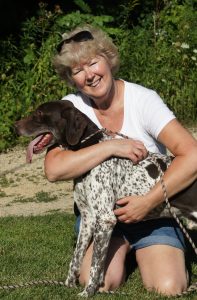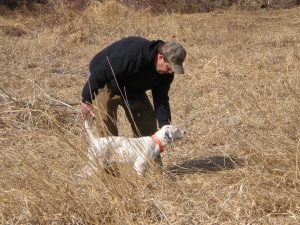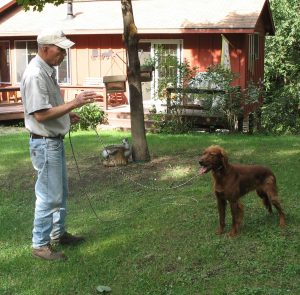Train Your Dog Yourself, or Use a Trainer?
Pointing Dog Pointers
By Bob and Jody Iler
Now that spring is finally here (we hope), we can all get outdoors again and spend time with our dogs. Spring and training pups go hand in hand. And new pointing dog owners are starting to think about training their growing pups as bird dogs. The question naturally arises, “Should I train my pup myself, or should I take my pup to a trainer?”
Here are some questions you should ask yourself if you want to train your pup on your own:
- Do you have the time to train a Class A bird dog? Does your work schedule allow for regular and consistent training sessions? Or do you travel in your job or have other important commitments that may make your training sporadic at best? Developing a bird dog takes time, lots of it, and the training never really ends!
- Do you have the knowledge to train a bird dog? Will you know what to do when problems in training arise (and they often will)? If not, are you willing to learn what you need to know first—before you begin training—rather than “experimenting” on your pup and hoping for the best?
- Do you have the grounds and birds needed to develop your bird dog? If not, do you have regular access to grounds and birds so that, once begun, your training program can continue and not lapse because you have no place to train and no birds to use?
- Do you have or are you willing to invest in, the equipment you’ll need for training, such as guns, whistle, lead, checkcord, traps, and electronic aids that may become necessary in your program?
- Last, but definitely not least, do you have the kind of personality or “temperament” to train your dog? Are you slow to get angry or upset? Are you patient? Are you fair, yet firm? Can you commit to something and see it through, even when discouraged? Do you love your dog enough to “do no harm” when you are training him?
If it sounds as though we are putting obstacles in front of you to promote the option of using a trainer, we’re not! We offer these questions to you so that you will seriously and honestly consider what you will need to properly develop your pointing dog. And if you’ve answered the questions positively, here are some advantages to training your pup yourself:
- Your dog may get more time and attention from you in your own training program than he would get with a trainer who handles a large amount of dogs at his or her kennel.When you train your dog yourself, you’ll have the pride and satisfaction of a job well done—of developing a partner for life. You’ll accomplish the goal of becoming a good amateur trainer!
- You’ll know exactly what is going on with your dog’s development if you train him yourself. You’ll see how he reacts to his training and what his strengths and weaknesses are. You’ll be able to give him any extra attention and practice he might need.
- You can keep a close eye on your dog’s physical and mental condition and you’ll know how he is handling the pressure of training when you do it yourself.
- Some dogs can become very stressed by the training kennel environment and all the other dogs. Training your dog yourself won’t present this problem.
- Lastly, you can save a lot of money by training your dog yourself. However, we must add here that if you can’t answer the first set of questions above honestly, and you go ahead with training your dog on your own—you could create some difficult problems with your dog that may require the assistance of a trainer to set things right. We’re talking here about gun shyness (which may or may not be able to be cured), blinking birds, handling problems, and more. If you doubt your ability to develop your dog well, don’t be penny-wise but pound-foolish.
If you are still not sure whether to train your dog yourself or not, here are a few things to consider about taking your dog to a trainer:
- The trainer’s full-time job is training bird dogs. The trainer’s reputation and repeat business means that he or she will do their best to develop your dog according to its abilities. Good trainers want happy, well-trained dogs—and happy owners!
- The trainer will have all the equipment and grounds needed for proper training.
- Your dog will have an average life span of 10 years or more as your hunting companion. The money invested in a good trainer is well spent.
- The trainer has the skills, temperament and knowledge to train bird dogs. More important, he’s trained many bird dogs and has the advantage of having dealt with multiple problems that have arisen during his years of training. This is the most important reason to have a trainer develop your dog—his or her knowledge, and ability to use that knowledge in properly developing your dog—is key.
- Trainers generally are not rich. They are training dogs because they are good at it and because they love to develop a class bird dog.
- Remember, do your research first. We are talking here about experienced, reputable trainers who have proven themselves over the years.
Maybe you’re still not sure whether to train your dog on your own or to take that special pup to a trainer. You may wonder—do you have any other options? Yes! Next month, we’ll talk about those options, along with their pros and cons! Happy spring!
Pointing Dog Pointers features monthly training tips by Bob and Jody Iler, who own Green Valley Kennels in Dubuque, Iowa. Bob and Jody have trained pointing dogs for over 35 years and have written many articles for The Pointing Dog Journal.





